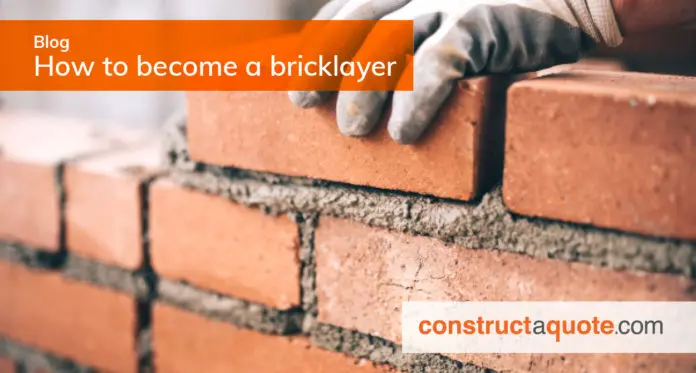by constructaquote - 20 June 2019


Bricklayers play an essential role in the construction industry, a sector that accounts for over £2 million jobs. As a bricklayer, you could be working on a small extension project or on a large development of new houses for a big building firm.
Bricklayers build houses, repair walls and chimneys and refurbish decorative stonework as well as working on restoration projects.
Bricklayers build, repair and maintain interior and exterior walls, as well as any other type of brickwork.
The majority of their work is carried out within the home, however, they are absolutely vital in a number of other areas of construction, with everything from archways and partitions through to chimney stacks and tunnel linings requiring a Bricklayer’s expertise.
Although bricks are their primary material, they may also use concrete blocks, stone, or precast panels to complete the job, according to Reed.
Day-to-day duties for a Bricklayer may include:

Bricklayers should be physically fit, understand technical plans, and be able to work as part of a team. An understanding of design technology would also be useful as new advances in construction technology come to fruition, according to UCAS.
Read our blog on: What insurance do bricklayers need?
According to the National Careers Service, the qualifications needed to become a bricklayer are:
These courses will teach you some of the skills needed for the job and can help you to find a trainee position with a building company.
You’ll usually need:

The average salary for bricklaying jobs is £36,679. In May 2019, the average salary for bricklaying jobs rose by £1,359 (14%), according to Total Jobs.
Read our blog on: What technology is disrupting the construction sector?
Coleg Gwent – Learners join bricklaying courses for a variety of reasons whether it’s to obtain qualifications to work in an industry or to learn enough skills to maintain and enhance their own properties.
Bricklayers can learn the skills to produce interesting and decorative features. The job itself can be physically demanding and the need for speed and accuracy is necessary when you are experienced. The skills learned can be used in a variety of settings including new build, refurbishment or saving yourself money on home improvements. Many bricklayers have the skills to wall and floor tile, lay paving bricks/slabs, render walls and screed floors.
Barking & Dagenham College – has 5 courses on offer including a DIY Saturday course covering a variety of trades. A City & Guilds Introduction to Bricklaying and Plastering Entry Level. A City & Guilds Bricklaying Diploma Level 1, 2, and 3.
Lincoln College – Bricklaying is a programme that will provide the underpinning skills and knowledge to progress through the levels of brick and block laying whilst exploring theoretically and practically the following topics at an appropriate level to begin. This programme will also offer support, preparing you for the construction industry.
This course teaches the following: The Principles of Building Construction, Information and Communication, Contribution to Setting Out and Building of Masonry Structures up to Damp Proof Course, Carrying out Block-laying Activities, Carrying out Bricklaying Activities, Carrying out Cavity Wall Activities, Health, Safety, and Welfare in Construction.
College of North West London – This bricklaying course is for you if you want to learn the basic skills required to enable you to seek a job in the industry. At this level you do not need experience, just enthusiasm and the commitment to learn and undertake a range of small projects. This course will help develop the skills employers in the industry are looking for, such as technical and practical skills, problem solving, team work and communication.
You will carry out a series of workshop tasks where you will learn to use a range of tools, including levels and string lines, foundations, cavity walls, and a range of different types of walls such as garden walls and structural walls.
The Manchester College – This qualification provides students with an understanding of the principles of organising, planning, and pricing construction work. This includes how to repair and maintain masonry structures, constructing radial and battered brickwork, constructing fireplaces and chimneys, and carrying out decorative and reinforced brickwork. Students will learn how to work in a safe, professional manner to an accepted code of practice, and how to follow the relevant health and safety regulations.

If you are a bricklayer, you are almost by definition going to be working on a building site. Accidents happen, some of which may may happen to you, to your employees and even to members of the public. Bricklayers’ insurance is designed to protect you from the financial fallout from such incidents and, in so doing, divert potential threats to the very existence and viability of your business.
Not every bricklaying enterprise is the same, of course, so any insurance you arrange needs to meet the requirements of your particular operation. Getting that right is important of course, but might sometimes you need help in identifying the policies available so that you can choose the appropriate policies for your particular needs.
The bricklayers’ insurance we arrange can accommodate the kinds and scale of contracts on which you intend to be working – whether you are a sole trader or the owner of a sizeable building company.
Disclaimer: The advice provided here are our own interpretations and opinions. We have tried to simplify the main points to create this article and the information provided is for general informational purposes only. While we try to keep the information up-to-date and correct, there are no representations or warranties, express or implied, about the completeness, accuracy, reliability, suitability or availability with respect to the information, products, services, or related graphics contained in this blog for any purpose. Any use of this information is at your own risk.

by Charlotte Houghton - 7 October 2020
by constructaquote - 6 October 2020
by Charlotte Houghton - 29 September 2020
by Charlotte Houghton - 24 September 2020